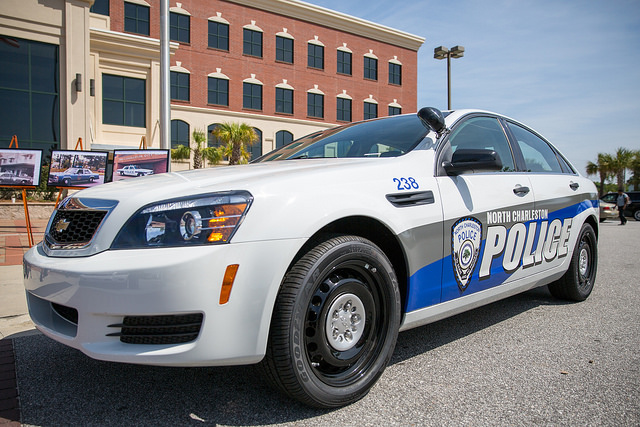By Jeff Brumley
Body cameras for police, it seems, are what the nation needs to ensure justice in the wake of last Saturday’s officer-involved shooting death of Walter Scott in North Charleston, S.C.
Christianity Today published a story Wednesday citing numerous Christian leaders touting video as a necessity in providing police transparency and accountability. Patrolman Michael Slager is charged with murder after his shooting of Scott was recorded on a bystander’s cellphone.
Even a White House spokesman said Scott’s shooting proves cops should wear body cameras.
But some clergy and community activists aren’t so sure that’s the silver bullet everyone is looking for.
“That’s sort of like a painkiller for someone who has cancer,” said Bill Stanfield, the CEO of Metanoia, a faith-based Community Development Corporation located just two miles from where Slager shot Scott in the back. “It alleviates symptoms of a bigger problem, but it doesn’t solve the larger issue.”

Stanfield and others who spoke with Baptist News Global say body cameras for police, while having benefits, don’t come anywhere close to providing solutions to the systemic social problems that resulted in Scott’s death.
‘The sin of militarism’
“Body cameras are nice, but let’s be honest: the issue isn’t body cameras,” said Wendell Griffen, pastor of New Millennium Church in Little Rock, Ark.
Griffen said he agrees with those calling for body cameras, but doesn’t believe they will have the justice-bringing results their proponents seek.
“The Rodney King beating was videotaped. The Eric Garner choking was videotaped. The shooting of Tamir Rice was caught on camera.”
And yet Scott still died from police violence, he said.
“The camera just records misbehavior or inhibits misbehavior in some — but people are going to figure out a way to circumvent the body camera technology,” Griffen said. “Let’s be honest about sin.”

Body cameras are needed but do not solve the fundamental problem, which is the poor or absent training of police to handle difficult encounters in peaceful ways.
Instead, the militaristic culture of American police departments, the larger pro-gun and pro-violence culture of the nation, encourage police to act as they did against King, Garner, Rice and others, Griffen said.
“We are recruiting people and training people to use violence as a means of resolving encounters that are not in and of themselves violent,” he said.
“Can a camera fix that problem?” he said. “Cameras on dashboards, on the body and in the air cannot fix that.”
What is needed is for clergy to become more demanding and prophetic in their preaching about “the sin of militarism” among police and society, he said.
“This is a moral and ethical issue and we have not challenged other clergy, political leaders and our congregations,” he said. “It’s hard to get pastors to take on the gun culture.”
Preachers should start from their own pulpits and from there go to the level of associations and denominations with that message, Griffen said.

“We must ask how does the gun culture square with our notion of Jesus?”
Pushes must also be made in seminaries and divinity schools to produce leaders willing to preach on this issue “in a way that is comprehensible from children on up.”
Failure to be counter-cultural in a violence-loving culture will make vest cameras for police useless, Griffen said.
“What happened in North Charleston was just a symbol when we allow the gun community to define how government uses force,” he said.
‘A compromise solution’
Police body cameras also have been sources of contention in some communities as debates rage over who can see the video. In some places the video is not available to the public.
“The cameras are a compromise solution,” said Trey Lyon, Cooperative Baptist field personnel based in Atlanta. “Who polices the police — internal review boards and internal affairs.”
Pastors and churches must make their voices heard on police violence issues, but also must remember their pastoral responsibilities, said Lyon, who leads ministry efforts in urban Atlanta communities.

“The guy who gets shot may be in your church, but the cops may also be in your church,” he said.
And a tool likely more effective than body cameras, he added, is requiring police officers to live in the communities where they work.
“It’s harder to shoot someone you know,” Lyon said. “It just is.”
‘I wouldn’t stop there’
Stanfield agrees that enhancements to community policing are part of the long-term solution to incidents like the Scott shooting.
Stanfield and his wife, Oliviera, are urban ministers who launched Metanoia as part of an anti-poverty initiative by CBF South Carolina. The grass-roots ministry works with youth and adults in areas such as financial literacy, housing and relationships between neighbors and police.
The ministry has been busy this week listening to community members share about the shooting and their own encounters with police. Stanfield, who lives in the neighborhood, too, said he’s seen citizens and police mistreat each other.
“If I were in the legislature and body cameras came up, I would vote for body cameras — but I wouldn’t stop there,” he said.
“I would want officers well trained about diversity and community policing so that body cameras become unnecessary.”
